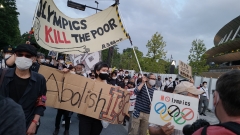29 July 2021
Small is beautiful!
I recently come to think "Small is beautiful" meaning you do not have to seek bigger size. Why not just stay in a small scale, which may be more comfortable?
I live in Tokyo, where so many tall modern buildings stand. But I am not attracted to such scenery any more.
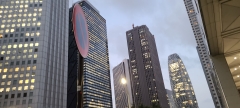
Now I am attracted to traditional district of Kyoto, where wooden low height houses line up.
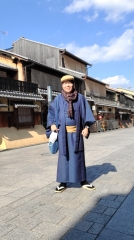
Tall modern buildings consume so much electricity that requires mega power plants causing mass emission of carbon dioxide or radioactives.
Since so many people gather in small areas, people become more susceptible to infectious disease like the current pandemic.
Why do we seek higher, bigger, and more gorgeous things? I am fed up with these things.
Not only the tall modern buildings but ongoing Tokyo Olympics are good example. Why do athletes want to compete with others for the gold medals? To become a hero, or get a prestigious status?
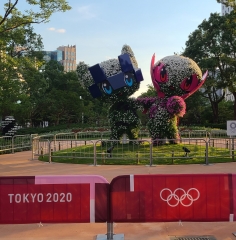
What is the significance of competing in Olympics? Is it worth risking their bodies? No way. Just a sport.
Major corporations utilize them as tools to boost their sales. Olympics are commercial shows.
This time due to the pandemic, no spectators are at the competition, meaning mass-gathering is a bad way for public health. Instead TV broadcasting worked.
Why do we need to watch such big events?
I would rather like to join a small banquet with ten or less people to be entertained by Geishas. So I can get much more closer to real entertainers than televised figures.
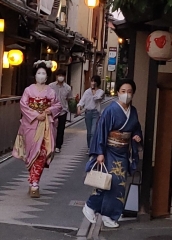
What should be the goal for humanity? I do not think tall modern buildings and Olympic athletes represents the answer.
15 June 2021
Don't send athletes to TOKYO, Dear Olympic organisers in the world
Dear Olympic Organisers in the world, who prepare for postponed 2020 TOKYO Olympics,
I, as a Tokyo resident want to deliver the message or warning to you.
"Don't send your athletes to TOKYO 2020 Summer Olympics in July to August ."
It is almost a month and a week until start of the Olympics amid COVID-19 pandemic.
I present 3 main reasons why holding this Olympics is not good.
- Tokyo is not in the mood for festival.
- Unethical Olympics
- Lack of medical resources
1. Tokyo is not in the mood for festival
It's been almost a year and half since the outbreak started. In Japan more than 10000 people died of COVID-19. Worldwide millions died of the virus infection. Life has been restricted. Since last year the state of emergency was declared 3 times in Tokyo. Bars and restaurants are ordered to close by 8PM and no alcohol is served. 2020 Tokyo Olympics was postponed to this year's summer.
This will go on until the nation is fully vaccinated, which might take another year. Many events related to the Olympics were cancelled. No festival and No excitement in the city. Everyone is wearing masks. Rather, opposition movement has been growing. Last month more than a hundred took to the street near the Olympic main stadium to call for cancellation of the Olympics.
Various opinion polls indicate majority of Japanese nationals want to either cancel or re-postpone the Olympics.
Athletes and their accompanying staff, and journalists who cover the venues will not be welcome by Tokyo citizens. As we are in midst of the pandemic, their activities are strictly limited. No tourism is allowed. People fear foreigners bring virus to the city and cause another clusters.
2. Unethical Olympics
If the Olympics is cancelled, the risk of spreading the virus would be avoided. But IOC want to go ahead for such risky event together with JOC and the government of Japan. For money?
Not only risk of spreading the virus but this Olympics has had some other unethical issues. One of the big issues was symbolised by resignation of former Chairman of JOC due to his sexist remarks. Then his position was replaced by a woman.
Olympics Athlete guideline tells athletes are not allowed to hug but condoms are provided to them.
The Japanese government has recently been asking schools to halt sports activities of students to avoid crowds.
Are these incosistent policies?
3. Lack of medical resources
Japan's vaccination rate is still very low compared to other advanced nations. Vaccination on elderlies has already started nationwide and is expected to complete by the end of July. But even at that point, majority of Japanese would not be vaccinated yet. Even when the Olympics is held, the vaccination should go on meaning many doctors and nurses would be needed. JOC requires 500 of nurses and doctors for the Olympics' 15000 athletes and 70000 accompanying staff and journalists while many people are desperate for vaccination and treatment by licensed doctors and nurses.
Health experts including Dr. OMI Shigeru, hired by the Japanese government claimed it is abnormal to hold the Olympics in such a period.
Recently people are dying at home not being admitted to hospitals due to the overcapacity.
Once the Olympics started, many people move out and gather to watch the games inside and outside the stadiums, that will cause another big clusters. Even you are vaccinated, new strings of coronavirus can possibly cause another infection. At this point there are still many unknown factors.
Athletes will be seen as disease carriers in Tokyo. Would they be happy staying in Tokyo? They might get another virus by interacting with other people and bring these to their homelands.
What you should do
Please reconsider the participation in this such risky sports event for the public health of your nation and the world.
Here in Japan, Tokyo Olympics is called "Operation Imphal" naming after a big fiasco by the Japanese army during second world war in which tens of thousands Japanese soldiers died of hunger in Imphal, India due to the lack of strategy and rationality.
Tokyo Olympics 2020 is the operation in which we can easily foresee the disaster.
Please don't send your precious athletes to such unhealthy venue!
Stay home and stay safe!
20:14 Posted in Health, Japan News, Society, Sports, Tokyo Life | Permalink | Comments (0) | Tags: covid-19, olympic
31 December 2020
First Episode of "Little house on the Prairie" Model life in Post-COVID-19 era?
I just happened to watch the old time TV show on internet. The TV drama-series "Little House on the Prairie" was first aired in 1970's US and later dubbed version of it was aired in Japan as well.
I liked the show but it seemed the stories in the show were mostly fiction or modified for the dramatic effect.
But the very first episode seems not since I read the original novel written by Laura Ingalls Wilder and compared to the episode.
It started with Ingalls family departing from the woods and found the place to settle down. They could have owned the land by cultivating the fields in accordance with Homestead Act of late 19th century, a pioneer period.
But they had to live in a very wild environment and had to deal with native people and wild animals. They had to dig the ground to make a well for water. They had to cut trees to make logs to build the house.
In a very small house, at first there was no floor boards and the roof was hood taken out from the horse carriage. What they had was only basic needs.
Our civilization is now on the edge due to the deadly flu and global climate change. It was because we try to have too much destroying the natural ecosystem. The modern system we rely on too much was found to be very vulnerable to such crisis.
It is time to rethink our way of life. "Little House on the Prairie" may be a good model of how one lives one's life without luxuries modern people have gotten used to.
The answer may be somewhat of that little wooden house or Native People, whom the family called "Indians" in the show.
19 November 2020
COVID-19 creates the very 21st century lifestyle and systems
New vaccines were recently invented for the flu. I guess things might be going back to pre-COVID-19 period.
But there should be three major lifestyle and system changes, which may remain in our society even after the pandemic is gone.
1. Basic Income; Wordwide lockdown measures let the world governments compensate their citizens for loss of income because they couldn't go to work or open restaurants. People and governments realized everyone needs basic income to prepare for such crisis, which may come unexpectedly in the future.
2. Online education and work; People realized there is no needs to spend extra-time or fees for commute to do the same things as we can easily do on internet.
3. Less crowded space to stay; People realized the more crowded place one is in, the higher risk of infection of the flu. Let’s always make a social distance everywhere, every time. Too many people gather in a small space is not desired. No more events like a rock concert in a big stadium. For businesses holding of big events to invite so many people is considered a great risk. That may have to be cancelled due to another pandemic resulting in a huge loss.
Designs of streets and buildings have to contain such notion. So in post-COVID-19 era, wider streets and corridors, bigger seats in less packed rooms and auditoriums. Conventional city layout should be drastically altered.
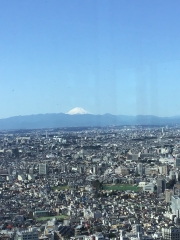
In that sense, rural lifestyle transcends urban one. More people will live in countryside and be able to work from home online not worrying about money because certain amount of money is paid or you can produce food on your farms so you do not die by losing jobs.
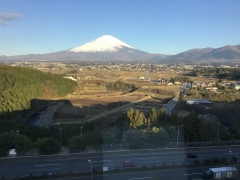
That is the very 21st century lifestyle.






